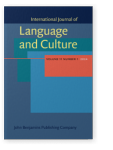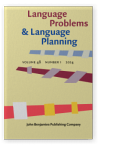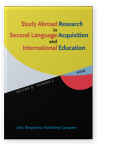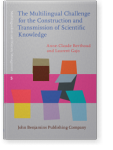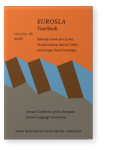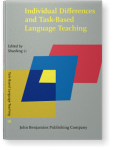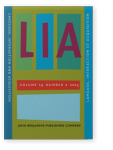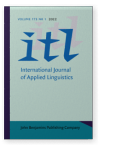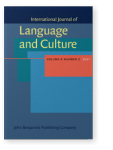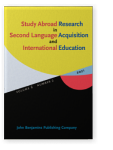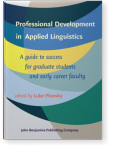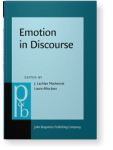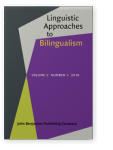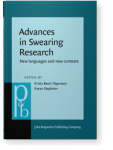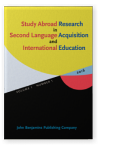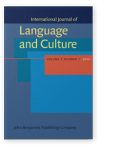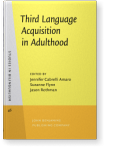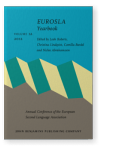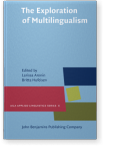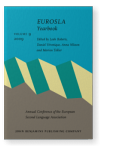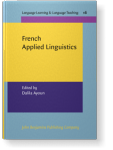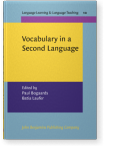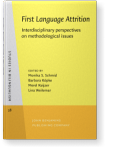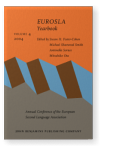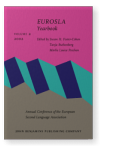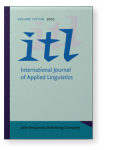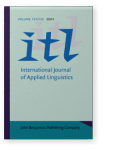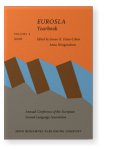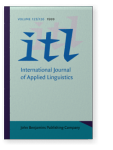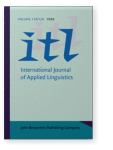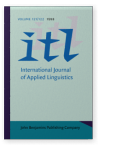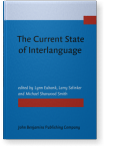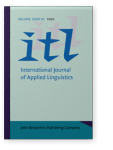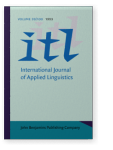Jean-Marc Dewaele
List of John Benjamins publications for which Jean-Marc Dewaele plays a role.
Journals
ISSN 0272-2690 | E-ISSN 1569-9889
ISSN 2405-5522 | E-ISSN 2405-5530
Book series
Yearbook
2024 Chapter 3. Understanding, measuring, and differentiating task enjoyment from foreign language enjoyment Individual Differences and Task-Based Language Teaching, Li, Shaofeng (ed.), pp. 84–110 | Chapter
This study aims to conceptualize and measure task-specific enjoyment and examine its links with general foreign language enjoyment. A 23-item Task Enjoyment Scale was developed based on interview data obtained after the completion of an L2 oral task. The scale was subsequently validated with two… read more
2023 Fluctuations des émotions éprouvées par des apprenants débutants dans cinq cours de Français Langue Etrangère: Une étude de cas multiples Language, Interaction and Acquisition 14:2, pp. 280–306 | Article
Cette étude de cas multiples vise à identifier les fluctuations des émotions de sept apprenants débutants dans cinq cours successifs de Français langue étrangère (FLE) en contexte universitaire. L’enseignant a utilisé une méthode d’apprentissage des langues axée sur l’engagement émotionnel des… read more
2022 The predictors of exam performance of Kazakh university students and secondary school pupils learning Turkish: An exploratory investigation ITL - International Journal of Applied Linguistics 173:1, pp. 94–119 | Article
The present study investigates the effect of sociobiographical, emotional, attitudinal characteristics and teacher perceptions of 275 Kazakh secondary school pupils and 317 university students on their exam performance in Turkish as a foreign language (FL). Multiple regression analyses reveal… read more
2021 How Saudi migrants’ metapragmatic judgments of Arabic L1 nonverbal greetings change after intense and prolonged exposure to English International Journal of Language and Culture 8:2, pp. 245–266 | Article
This study investigates the impact of spending more than three years in an English environment on Saudi migrants’ metapragmatic judgments of Arabic L1 nonverbal greetings and their personality traits. Participants are 437 adults comprising three groups: Saudi L2 speakers of English in the UK,… read more
2021 Fluctuations in mental well-being during Study Abroad Study Abroad Research in Second Language Acquisition and International Education 6:2, pp. 214–243 | Article
This mixed-methods study focuses on the effect of Study Abroad (SA) on the mental well-being of 33 Anglophone students who spent between four and twelve months in Francophone countries. It investigates the relationship between well-being and personality traits. Statistical analyses revealed no… read more
2020 Chapter 11. Supervising doctoral students and managing the supervisor-supervisee relationship Professional Development in Applied Linguistics: A guide to success for graduate students and early career faculty, Plonsky, Luke (ed.), pp. 153–164 | Chapter
Highlights: Trust and mutual respect; encouraging scientific creativity; PhD as transformative process; physical, social and emotional balance; pride and humility, the right attitude at conferences and in papers; handling expectations; getting over “Kleenex” moments; dealing with critical… read more
2019 Chapter 11. The effects of linguistic proficiency, Trait Emotional Intelligence and in-group advantage on emotion recognition by British and American English L1 users Emotion in Discourse, Mackenzie, J. Lachlan and Laura Alba-Juez (eds.), pp. 279–300 | Chapter
This chapter focuses on individual differences in emotion recognition ability (ERA) of 150 British and 151 American first language (L1) users of English (151 females, 150 males). Individual differences in ERA have been linked to linguistic, cultural and psychological profiles of individuals. The… read more
2018 Glimpses of semantic restructuring of English emotion-laden words of American English L1 users residing outside the USA Linguistic Approaches to Bilingualism 8:3, pp. 320–342 | Article
The present exploratory study focuses on the effect of living outside the USA on the understanding of the meaning, the perceived offensiveness and the self-reported frequency of use of four English emotion-laden words of British origin and four English emotion-laden words of American origin… read more
2017 Chapter 11. Epilogue Advances in Swearing Research: New languages and new contexts, Beers Fägersten, Kristy and Karyn Stapleton (eds.), pp. 257–262 | Chapter
2016 Personality changes after the ‘year abroad’? A mixed-methods study Study Abroad Research in Second Language Acquisition and International Education 1:1, pp. 107–127 | Article
This study utilizes a mixed-methods approach to investigate personality changes of British undergraduate students who spent their third year abroad in a French or Spanish-speaking country. Personality changes were measured quantitatively using the Multicultural Personality Questionnaire (MPQ, Van… read more
2015 Emotion recognition ability in English among L1 and LX users of English International Journal of Language and Culture 2:1, pp. 62–86 | Article
This article focuses on individual differences in emotion recognition ability among 356 first language (L1) and 564 foreign language (LX) users of English. Recognizing emotions can be particularly challenging in LX contexts. Depending on their linguistic profile, individuals may interpret input… read more
2012 Variation in self-perceived proficiency in two 'local' and two foreign languages among Galician students Third Language Acquisition in Adulthood, Cabrelli, Jennifer, Suzanne Flynn and Jason Rothman (eds.), pp. 223–254 | Article
This contribution investigates interindividual variation in self-perceived proficiency ratings for speaking, listening, reading and writing of 122 Galician students in Spanish, Galician, English and French. The independent variables include family and school language(s), the number of languages… read more
2012 Personality and L2 use: The advantage of being openminded and self-confident in an immigration context EUROSLA Yearbook: Volume 12 (2012), Roberts, Leah, Christina Lindqvist, Camilla Bardel and Niclas Abrahamsson (eds.), pp. 112–134 | Article
Researchers working on the effects of study abroad are always baffled by the huge individual differences in the development of a target language (TL) among students – who could be considered as temporary immigrants (Kinginger 2011; Regan et al. 2009). Researchers often speculate that these… read more
2009 4. The development of psycholinguistic research on crosslinguistic influence The Exploration of Multilingualism: Development of research on L3, multilingualism and multiple language acquisition, Aronin, Larissa and Britta Hufeisen (eds.), pp. 63–77 | Chapter
The present chapter describes the development of psycholinguistic research on crosslinguistic influence. It focuses more specifically on key topics covered in the last decennia, how and when the discipline effectively branched out to frameworks not previously examined in CLI research, and the… read more
2009 Age effects on self-perceived communicative competence and language choice among adult multilinguals EUROSLA Yearbook: Volume 9 (2009), Roberts, Leah, Georges Daniel Véronique, Anna Nilsson and Marion Tellier (eds.), pp. 245–268 | Article
The present study focuses on the effects of age of acquisition (AoA) on dependent variables that have been traditionally overlooked in research on age effects: (1) self-perceived communicative competence in speaking, comprehending, reading and writing; (2) language choice for emotional speech in… read more
2007 Diachronic and/or synchronic variation? The acquisition of sociolinguistic competence in L2 French French Applied Linguistics, Ayoun, Dalila (ed.), pp. 208–236 | Article
2004 7. Individual differences in the use of colloquial vocabulary: The effects of sociobiographical and psychological factors Vocabulary in a Second Language: Selection, acquisition, and testing, Bogaards, Paul and Batia Laufer (eds.), pp. 127–153 | Chapter
2004 Perceived language dominance and language preference for emotional speech: The implications for attrition research First Language Attrition: Interdisciplinary perspectives on methodological issues, Schmid, Monika S., Barbara Köpke, Merel Keijzer and Lina Weilemar (eds.), pp. 81–104 | Article
2004 Tense/aspect, verb meaning and perception of emotional intensity by native and non-native users of English EUROSLA Yearbook: Volume 4 (2004), Foster-Cohen, Susan H., Michael Sharwood Smith, Antonella Sorace and Mitsuhiko Ota (eds.), pp. 231–252 | Article
2002 Using sociostylistic variants in advanced French interlanguage: The case of nous/on EUROSLA Yearbook: Volume 2 (2002), Foster-Cohen, Susan H., Tanja Ruthenberg and Marie Louise Poschen (eds.), pp. 205–226 | Article
This study investigates the use of pronouns nous and a subgroup of on in a corpus of advanced oral and written French interlanguage produced by 32 Dutch L1 speakers. The subject nous + first person plural verb is characteristic of formal styles while on + third person singular verb is typical of… read more
2001 The use of colloquial words in advanced French interlanguage EUROSLA Yearbook: Volume 1 (2001), Foster-Cohen, Susan H. and Anna Nizegorodcew (eds.), pp. 51–67 | Article
This article addresses the issue of underrepresentation or avoidance of colloquial words in a cross-sectional corpus of advanced French interlanguage (IL) of 29 Dutch L1 speakers and in a longitudinal corpus of 6 Hiberno-Irish English L1 speakers compared with a control group of 6 native speakers… read more
1999 Word order variation in French interrogative structures ITL - International Journal of Applied Linguistics 125/126, pp. 161–180 | Article
Inter-individual variation in the use of direct interrogative structures (N = 450) is explored in a corpus of spoken native and non-native French. A quantitative analysis of the data reveals that while non-native speakers seem to avoid non-standard structures, they do not use more formal variants… read more
1998 The effect of gender on the choice of speech style ITL - International Journal of Applied Linguistics 119/120, pp. 9–26 | Article
The analysis of a number of linguistic variables reflecting formality in the advanced oral French interlanguage of 27 Dutch-speaking students showed significant differences between male and female speakers. Female speakers were found to opt for a much more implicit and deictical speech style,… read more
1998 La langue influence-t-elle la pensée? un état de la question ITL - International Journal of Applied Linguistics 121/122, pp. 27–38 | Article
Langue et pensée ont longtemps été considérées indissociables. La langue, pensait-on, déterminait la pensée de l'individu. Des études récentes en linguistique et en psycholinguistique suggèrent cependant que le lien entre langue et pensée est beaucoup plus nuancé que l'on imaginait.
read more1995 Style-shifting in oral interlanguage: Quantification and definition The Current State of Interlanguage: Studies in honor of William E. Rutherford, Eubank, Lynn, Larry Selinker and Michael Sharwood Smith (eds.), pp. 233–240 | Article
1995 Variation synchronique dans l’interlangue: analyse critique du Modèle du Caméléon de E. Tarone ITL - International Journal of Applied Linguistics 109/110, pp. 1–18 | Article
Dans cet article nous analysons le modèle d’inspiration labovienne que Elaine Tarone a développé pour expliquer la variation dans l’interlangue. Le “Modèle du Caméléon” connaît un vif succès depuis les années quatre-vingts malgré un manque de preuves empiriques de ses hypothèses. La théorie de… read more
1993 Extraversion et richesse lexicale dans deux styles d'interlangue française. ITL - International Journal of Applied Linguistics 99/100, pp. 87–105 | Article
Dans cet article nous cherchons dans quelle mesure certains traits de la personnalité (en l'occurrence le degré d'extraversion) permettent d'expliquer des phénomènes de variation synchronique interindividuelle dans deux styles d'interlangue de nos 21 locuteurs néerlandopho nes parlant français.… read more
